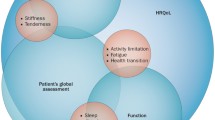Summary
In recent years, outcome, or health status, measurement has received wide attention in rheumatology. These measures are based on the concept of maintaining or improving health as the goal of medical care, the World Health Organization (WHO) definition of health, and measurement of those factors that directly impact the patient rather than the traditional measures of disease process. Within this framework, outcomes important to the patient with rheumatic diseases have been identified. They have been conceptualized in general terms of physical, psychological and social functioning or specificallyy by dimensions of death, disability, discomfort, side effects and economic costs. Two widely used outcome measures, the health assessment questionnaire (HAQ) and the arthritis impact measurement scales (AIMS), are described. Outcomes are measured by patient self-reported questionnaires which have been rigorously tested to establish the measurement properties of reliability and validity. Results show that patient self-report is valid, outcomes are accurately measured, correlate with traditional endpoints, and are sensitive to change over time. These measures are particularly suited for use in follow-up studies because of their simplicity, ease of administration, and cost. Future directions include additional study to define clinically meaningful change, extension of validations to many of the rheumatic diseases, the design of special purpose questionnaires and the development of the cumulative outcome concept.
Similar content being viewed by others
References
World Health Organization. The first ten years of the world health organization. Geneva: WHO 1958.
Fries, J.F. Toward an understanding of patient outcome measurement. Arthritis Rheum 1983, 26, 697–704.
Fries, J.F., Spitz, P.W., Kraines, R.G., et al. Measurement of patient outcome in arthritis. Arthritis Rheum 1980, 23, 137–145.
Meenan, R.F., Gertman, P.M., Mason, J.H. Measuring health status in arthritis: the arthritis impact measure scales. Arthritis Rheum 1980, 23, 146–152.
Fries, J.F., Spitz, P.W., Young, D.Y. The dimensions of health outcomes: the health assessment questionnaire, disability and pain scales. J Rheumatol 1982, 9, 789–793.
Brown, J.H., Kazis, L.E., Spitz, P.W., German, P., Fries, J.F., Meenan, R.F. The dimensions of health outcomes: a cross-validated examination of health status measurement. AJPH 1984, 74, 159–161.
Meenan, R.F., Gertman, P.M., Mason, J.H., Dunaif, R. The arthritis impact measurement scales: further investigations of a health status measure. Arthritis Rheum 1982, 25, 1048–1053.
Meenan, R.F., The AIMS approach to health status measurement: conceptual background and measurement properties. J Rheumatol 1982, 9, 785–788.
Meenan, R.F., Anderson, J.J., Kazis, L.E., et al. Outcome assessment in clinical trials, evidence for the sensitivity of a health status measure. Arthritis Rheum 1984, 27, 1344–1352.
The Auranofin Cooperating Group. Sensitivity to change of health status measures in a clinical trial of auranofin in RA. Arthritis Rheum 1985, 28, 528 (abstract).
Fries, J.F., Spitz, P.W., Mitchell, D.B., et al. Impact of specific therapies upon rheumatoid arthritis. Arthritis Rheum 1986, 29, 620–627.
Wolfe, F., Kleinheksel, S. M., Spitz, P. W., et al. A multi-center study of hospitalization in rheumatoid arthritis: frequency, medical-surgical admissions and charges. Arthritis Rheum 1986, 29, 614–619.
Wolfe, F., Kleinheksel, S.M., Spitz, P.W., et al. A multi-center study of hospitalization in rheumatoid arthritis: effects of health care system, severity and regional differences. J Rheumatol 1986, 13, 277–284.
Lubeck, D.P., Spitz, P.W., Fries, J.F., et al. A multi-center study of annual health service utilization and costs in rheumatoid arthritis. Arthritis Rheum 1986, 29, 488–493.
Mason, J.H., Weener, J.L., Gertman, P.M., Meenan, R.F. Health status in chronic disease: a comparative study of rheumatoid arthritis. J Rheumatol 1983, 10, 763–768.
Sherrer, Y.S., Bloch, D.A., Mitchell, D.M., et al. The development of disability in rheumatoid arthritis. Arthritis Rheum 1986, 29, 494–500.
Fries, J.F. The assessment of disability; from first to future principles. Br J Rheumatol 1983, 22 (supp), 48–58.
Dixon, J.S., Wright, V. Outcome measures and anti-rheumatic drugs: a critical appraisal (ed.). Clin Exp Rheum 1986, 4, 1–2.
Author information
Authors and Affiliations
Rights and permissions
About this article
Cite this article
Spitz, P.W., Fries, J.F. The present and future of comprehensive outcome measures for rheumatic diseases. Clin Rheumatol 6 (Suppl 2), 105–111 (1987). https://doi.org/10.1007/BF02203393
Issue Date:
DOI: https://doi.org/10.1007/BF02203393




